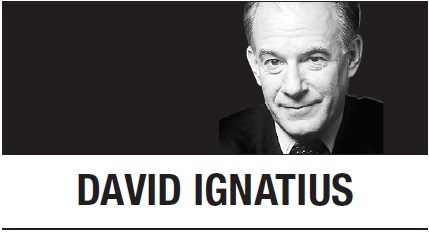[David Ignatius] Trump is hurling a wrecking ball toward the trans-Atlantic alliance
By David IgnatiusPublished : June 24, 2018 - 17:51
 A bright banner at NATO’s lavish new headquarters here proclaims the core conviction of the trans-Atlantic alliance: “We are together. We are strong.” But the words seem a bit hollow these days, as US President Trump escalates his attacks on America’s traditional European partners.
A bright banner at NATO’s lavish new headquarters here proclaims the core conviction of the trans-Atlantic alliance: “We are together. We are strong.” But the words seem a bit hollow these days, as US President Trump escalates his attacks on America’s traditional European partners.Trump’s “America First” policies have shaken many of the nations that looked to Washington as their ally and protector. He has imposed steep tariffs on European steel and aluminum imports and is said to be preparing similar tariffs against European automakers. He hectored European leaders at this month’s G-7 summit meeting and refused to sign the communique -- and suggested that Russia rejoin the elite group, even as Europe tries to resist Moscow’s aggressive policies.
Europeans were dazed and in denial during the first year of Trump’s presidency, but they’re now talking about ways to fight back. That was the message of a gathering here this week of European and American foreign-policy experts to discuss the “Crisis across the Atlantic.” Conference participants described the rupture as “toxic,” “an electric shock,” “an unraveling” and a possible “train wreck.”
“This is the most serious trans-Atlantic crisis in 70 years, because the Europeans do not believe that Trump is committed to the European Union, NATO or the democratic values that are the foundation of the alliance,” argued Nicholas Burns, a former undersecretary of state who directs the Aspen Strategy Group, which helped organize the meeting. The sessions weren’t for attribution, but some of the speakers agreed to comment on the record. (I was invited as a member of the strategy group.)
Europeans and Americans say they fear that trans-Atlantic tension may disrupt the NATO summit planned here next month. Trump is scheduled to attend, but his possible meeting with Russian President Vladimir Putin, before or after, may overshadow the NATO session. And Trump may use the Brussels gathering to lecture Europeans anew, widening the fissure.
“A NATO summit has only one deliverable, which is cohesion and solidarity,” notes Douglas Lute, a former US ambassador to NATO. “The likelihood is that we’ll come out with disagreements on the communique,” which could produce a “destructive summit.”
Trump’s pique at Europe has been evident since the first days of his presidency. As one conference attendee put it, the European Union represents everything Trump hates: It’s multilateral, liberal in its social policies, committed to free trade, anxious about climate change and, worst of all, unwilling to pay enough for its defense.
A special Trump target has been German Chancellor Angela Merkel, who leads Europe’s strongest economy. With Merkel facing unrest within her governing coalition, Trump this week took the astonishing step of attacking her government in what amounted to a presidential intervention in German politics. “The people of Germany are turning against their leadership as migration is rocking the already tenuous Berlin coalition,” Trump tweeted. Even by Trump’s standards, this was a shocker.
What’s new is that Europeans are pushing back. German Foreign Minister Heiko Maas last week blasted Trump’s “egoistic policy of ’America First,’” and said that “the Atlantic has become wider” during his presidency. “That world order that we once knew ... no longer exists,” he lamented.
Europe’s retaliation starts with what Maas called “appropriate countermeasures” against the steel and aluminum tariffs. Europeans here talked of a broader effort to develop independent European security policies, so that nations are less dependent on a newly unreliable America. Francois Heisbourg, a French security expert, urged Europeans to “speak softly and build a big stick.”
Mark Leonard, who heads the European Council on Foreign Relations, argued that Europe should stop “appeasement” of Trump and focus on its own security interests. This stance was endorsed by Philip Zelikow, a former State Department official who teaches at the University of Virginia. He cautioned against fretting before the NATO summit: “Will the good Donald Trump show up or the bad one? Will he praise us or spank us? This is infantilism.”
The Euro-American confrontation will deepen if the Trump administration follows through on its threat to impose secondary sanctions against European companies that do business with Iran, after the US has withdrawn from the nuclear deal. One former senior EU official argued that Europe should respond not simply with a “blocking statute” that checks American reprisals, but with its own countersanctions against American companies.
If you’ve grown up in the benign shadow of the trans-Atlantic alliance, and viewed this partnership as a pillar of global peace and prosperity, these are strange times indeed. It took seven decades to build this structure, but the wrecking ball that is the Trump presidency is assaulting it, piece by piece. Here’s hoping he fails.
David Ignatius
David Ignatius can be reached via Twitter: @IgnatiusPost. -- Ed.
(Washington Post Writers Group)







![[KH Explains] How should Korea adjust its trade defenses against Chinese EVs?](http://res.heraldm.com/phpwas/restmb_idxmake.php?idx=644&simg=/content/image/2024/04/15/20240415050562_0.jpg&u=20240415144419)











![[Today’s K-pop] Stray Kids to return soon: report](http://res.heraldm.com/phpwas/restmb_idxmake.php?idx=642&simg=/content/image/2024/04/16/20240416050713_0.jpg&u=)